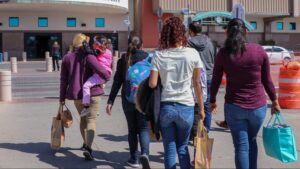- Slug: Mixed-Status Families. 955 words.
- File photos available (thumbnails, captions below).
By Mia Osmonbekov
Cronkite News
WASHINGTON – Fear for his undocumented parents haunted Mario Montoya throughout his childhood in Mesa. Sometimes it turned to outright terror, like the time his mom got into a car crash.
“One of my first thoughts was … what if the police asked for her immigration status?” said Montoya, 26, who now studies law in Seattle. “What if I don’t see her again?”
His parents finally received legal status a few months ago, 11 years after President Barack Obama’s Deferred Action for Childhood Arrivals program, or DACA, lifted the risk of deportation from their son.
Nationwide, 22 million people live in mixed-status households, including over half a million in Arizona, according to estimates from FWD.us, an immigration advocacy group. In these homes, anxiety never goes away – and the actual risk of deportation can hinge on elections.
Former President Donald Trump has vowed to launch “the largest deportation operation in the history of our country,” and to eventually round up and expel everyone living in the country illegally – a population pegged at 11 million in 2022 in an April report from the Department of Homeland Security.
Deportation on that scale would impact another 11 million Americans who live with those undocumented immigrants – children, siblings and parents.
Asked last month during a visit to the U.S.-Mexico border in Arizona whether he would deport undocumented immigrants with a child or spouse who is an American citizen, Trump told NBC News that “provisions will be made, but we have to get the criminals out.”
Montoya calls the plan “inhumane” and worries that Trump would be able to deliver on promises if he wins again. “He’s going to be more prepared than he was last term to try to enforce what he wants,” he said.
Vice President Kamala Harris has promised to ramp up border security – a nod to concerns that illegal crossings hit record levels under President Joe Biden.
At a rally in Glendale on Aug. 9, Harris told the crowd that her vision for immigration reform “includes strong border security and an earned pathway to citizenship.”
She’s vowed to sign the bipartisan border bill that Trump helped to quash in May.
That bill would have added $20 billion to the Homeland Security budget, made it harder to request and receive asylum, and let authorities shut the border when illegal crossings spiked.
It offered no special protection for undocumented immigrants. Nor did it extend the DACA program that helped Montoya and hundreds of thousands of others brought into the country illegally as children.
“At the moment, I don’t really have faith in any party when it comes to immigration rights,” said
Kevin Carreño Wissar, 21, a Glendale Community College student born in Chihuahua, Mexico.
Wissar said he came to the United States at age 6. He’ll be eligible to apply for a green card next year – lawful residency – after a decade of waiting.
“In my ideal world, I would just want there to be a way for anybody here that is considered undocumented to have an actual pathway to citizenship,” he said.
It’s not the only looming concern for mixed-status families in Arizona.
Republicans in the Legislature put a measure called Proposition 314 on the November ballot that would make it a state crime to cross the border illegally. If approved, police could arrest anyone who can’t prove U.S. citizenship or legal residency and state courts could order deportations. Federal courts have blocked similar laws in Texas and other states.
Immigrant advocates point to Trump’s record as president as evidence he would pursue harsh policies if reelected.
Under a “zero tolerance” policy that began in summer 2018, federal authorities separated 5,000 children from their parents. Visa denials skyrocketed under his administration. During the COVID-19 pandemic, Trump used an emergency public health authority known as Title 42 to order mass expulsions and turn away asylum seekers.
If Harris wins, “we don’t expect that any of those ridiculous things would happen,” said Yunuen Trujillo, a managing attorney at the Coalition for Humane Immigrant Rights. “Based on what (Trump) did in the past also meant that if there was a denial, even if it was for a ridiculous reason, you know that that person could be transferred to ICE for deportation proceedings.”
Lynn Marcus, director of the immigration law clinic at the University of Arizona law school, agreed that Harris would “seek to avoid family separation since she’s emphasized keeping families together.”
“Trump’s position has always been that the rule of law is paramount and to him that means rounding up and deporting everyone who is deportable without regard to individual circumstances or ties to U.S. citizens,” she said.
Undocumented adults have few options to seek naturalization without leaving the country.
“There’s a huge risk that if you leave the country you’ll lose your job, be stranded abroad, run out of money, be at risk from violence from cartels,” Marcus said. It’s “a significant impediment to people who could otherwise qualify to get a green card.”
Apart from military families, parole in place – remaining legally in the U.S. while awaiting naturalization – is generally not an option.
Biden’s Keeping Families Together initiative, unveiled last month, would extend parole in place to an estimated 500,000 undocumented spouses and 50,000 undocumented stepchildren of U.S. citizens. A federal judge in Texas temporarily halted the policy late last month.
According to U.S. Citizenship and Immigration Services, the people targeted by the new policy have lived in the U.S. for an average of 23 years.
“One of the biggest myths is that if (an undocumented) person is married to a U.S. citizen, it’s a defense against deportation or they can apply for a green card and get one,” Marcus said.
For more stories from Cronkite News, visit cronkitenews.azpbs.org.

